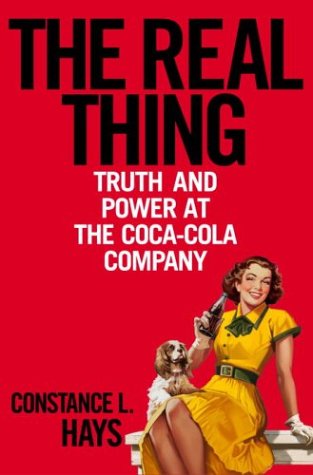|
BY
RICHARD PACHTER
rpachter@wordsonwords.com
Originally
published on Monday, February 2, 2003 in The Miami Herald.
Coca Cola is flavored, colored, caffeinated, carbonated sugar water.
That a culture and mystique have grown up around it is amazing;
that a huge, multibillion dollar international corporation has resulted
from the manufacture and distribution of this beverage is astounding.
But we rarely regard it so, given the long history and ''personal''
relationship many people have developed with Coke (or as they call
it in its hometown of Atlanta, ``Co'Cola''). Some collect its memorabilia:
signs, glasses, serving trays, advertising posters, bottles, caps,
cans -- anything emblazoned with the Coke name or logo.
But the history of the drink and the companies that grew to promote
and sell it is a colorful one. Business journalist Constance Hays
was up to the task; this extremely well researched, surprisingly
entertaining saga is told almost like a novel with a broad panorama
and a colorful and memorable cast.
Joseph Priestly, the discoverer of oxygen, perfected the technique
of introducing carbon dioxide into water in 1767. The bubbly drink
was declared to possess miraculous restorative powers by its users
and medical authorities. Mixed with fruit juice, it became an even
more marketable and attractive product.
Along with other carbonated beverages, the nascent Coca Cola was
originally dispensed and was only available at pharmacies, which
increased its perceived value. One of the first marketing moves
by the early management of the newly popular drink was to ensure
that it was classified as a food, rather than as a drug by the appropriate
authorities, despite its slight cocaine content. The cocaine was
removed early in the product's life, but the soft drink was referred
to as ''dope,'' especially in the South, for many years thereafter
Hays tells of the founding of the Coca Cola company, and how the
owners gave away the rights to bottle the stuff, selling the syrup
to the packagers at a fixed price, originally ''in perpetuity.''
This was eventually discovered to be a monumentally bad deal for
the company, since it created a secondary business that the primary
one was unable to control.
Eventually, Coca Cola managed to buy up the bottlers, and according
to Hays, created a new entity of which it owned less than half,
but still controlled. Interestingly, Coca Cola managed to foist
off much of its debt and operational costs on the other firm, but
got away with (and benefited from) this bookkeeping sleight of hand
for many years.
The business end of the story can be a bit dry at times, but Hays'
accounts of Coke's executives, particularly the legendary Roberto
Goizueta, who died in 1997, are lively and sharply drawn. The introduction
of New Coke, a classic marketing miscalculation spearheaded by that
colorful and indomitable CEO, is especially well told, as is the
ouster of Goizueta's successor, Doug Ivester, by investors Herbert
Allen and Warren Buffett.
.
The consequences of the company's long and shameful history of racial
discrimination (despite funding many of Rev. Jesse Jackson's initiatives)
are also recounted in vivid detail, the result, no doubt, of the
author's interviews with vital primary sources.
In sum, The Real Thing is a fascinating and revealing portrait of
an American institution and an international icon, one that will
be studied for years to come.
|

